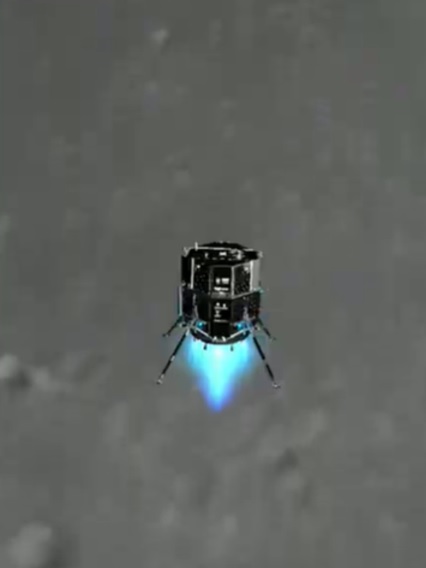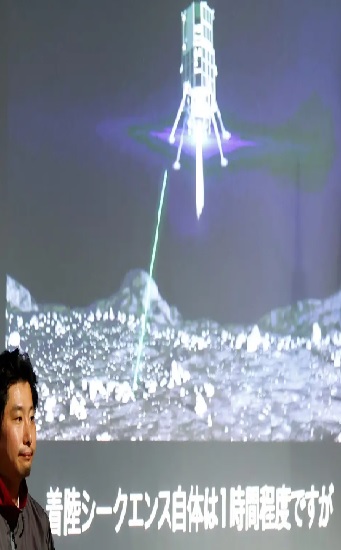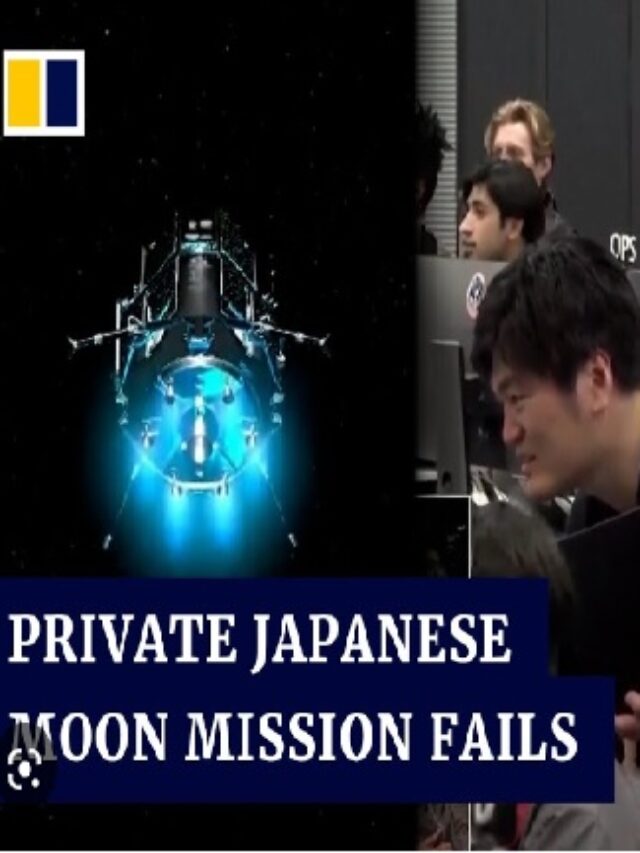Breaking: Japanese Lunar Lander Loses Contact with Ground Control
On April 26, 2023, the world was met with the breaking news that the Japanese lunar lander, Jikuu-5, had lost contact with ground control. This was a significant setback for the mission, which aimed to study the lunar surface and search for signs of water ice. As the world waits for updates, here’s what we know so far.
The Details of the Mission

The Jikuu-5 lunar lander was launched on April 10, 2023, as part of Japan’s ambitious lunar exploration program. The mission aimed to land on the lunar south pole, which is believed to have deposits of water ice that could be used for future human exploration.
The Potential Cause of the Communication Failure
While the exact cause of the communication failure is not yet known, it’s possible that the lunar lander experienced technical difficulties or suffered damage during its descent. The mission was also subject to the harsh lunar environment, which includes extreme temperatures and rugged terrain.
The Race to Regain Contact
Since the communication failure, ground control has been working around the clock to reestablish contact with the lunar lander. The JAXA (Japan Aerospace Exploration Agency) has been using a network of antennas around the world to try and communicate with the lander, but so far, no signal has been detected.
The Significance of the Mission

The Jikuu-5 mission was a significant milestone for Japan’s space program and for lunar exploration as a whole. If successful, the mission would have been the first Japanese spacecraft to land on the lunar surface and the first to search for water ice in the polar regions.
Lessons Learned from Previous Lunar Missions
The Jikuu-5 mission drew on the experience and knowledge gained from previous lunar missions, including the Apollo missions and the recent Chinese Chang’e missions. These missions have helped to shape the design and operation of the Jikuu-5 lander, as well as the scientific objectives of the mission.
The Role of International Collaboration
The Jikuu-5 mission was part of an international effort to explore and study the Moon. Japan has collaborated with other space agencies, including NASA, in previous lunar missions, and this mission involved collaboration with the Canadian Space Agency and the European Space Agency.
Potential Future Implications
The outcome of the Jikuu-5 mission could have implications for the future of lunar exploration and the search for water ice on the Moon. If water ice is found, it could be used to support future human missions to the Moon and beyond.
The Impact on the Scientific Community
The Jikuu-5 mission was expected to yield valuable scientific data on the lunar surface and the potential for water ice. The loss of contact is a significant setback for the scientific community, who were eagerly anticipating the results of the mission.
The Emotional Impact of the Mission
The loss of contact with the Jikuu-5 lander has had an emotional impact on those involved in the mission and on the wider public. Space exploration is a risky business, and setbacks such as this serve as a reminder of the challenges involved in exploring the final frontier.
The Impact on Japan’s Space Program
The Jikuu-5 mission was a significant part of Japan’s space program, which has been making strides in recent years. The impact of the communication failure on the program and its future plans remains to be seen.
The Public Reaction to the News
The news of the Jikuu-5 lander’s communication failure has been met with interest and concern from the public. Social media platforms have been buzzing with updates and speculation about the cause of the failure and the potential implications for the mission.
The Challenges of Lunar Exploration
The Jikuu-5 mission highlights the challenges involved in lunar exploration, including the harsh lunar environment, the technical difficulties of landing on the surface, and the risks involved in space exploration.
The Importance of International Collaboration
International collaboration is essential to the success of space missions, including lunar exploration. The Jikuu-5 mission involved collaboration with multiple space agencies and highlights the importance of working together to achieve common goals.
The Potential for Future Lunar Missions
Despite the setback, the potential for future lunar missions remains strong. The Jikuu-5 mission was part of a larger effort to explore and study the Moon, and future missions will continue to build on the knowledge and experience gained from previous efforts.
The Role of Private Companies in Space Exploration
The Jikuu-5 mission was a government-led effort, but private companies are also playing an increasingly important role in space exploration. Companies such as SpaceX and Blue Origin are investing heavily in space technology and are developing their own lunar exploration programs.
The Ethical Considerations of Space Exploration
Space exploration raises ethical considerations, including the impact on the environment and the allocation of resources. The Jikuu-5 mission, like other space missions, must be balanced against ethical considerations to ensure that the benefits outweigh the costs.
The Impact on Japan’s Economy
The Jikuu-5 mission was also expected to have a positive impact on Japan’s economy, as it would have created jobs and spurred innovation in the country’s space industry. Communication failure could have a negative impact on these expectations.
The Role of Space Exploration in Human Progress
Space exploration has long been seen as a symbol of human progress and innovation. The Jikuu-5 mission, like other space missions, is part of a larger effort to explore and understand the universe and our place in it.
The Importance of Continued Support for Space Exploration
The Jikuu-5 mission is a reminder of the importance of continued support for space exploration, both in terms of funding and public support. Space exploration has the potential to yield valuable scientific discoveries, as well as inspire future generations to pursue careers in science and technology.
Also read this post for more updates: The exciting Supermassive black hole M87 blasts a jet 1st time
Why Northern Lights aurora borealis shifted in the United States: A Natural Phenomenon Explained
Blue Origin Joins NASA for Space Tech Collaboration Round 2
Mars 1st Seismic Waves Confirm Liquid Core Existence
Runaway black hole births stars
FAQ
Q: What is the Jikuu-5 mission?
A: It was a lunar exploration mission launched by the Japanese space agency JAXA.
Q: What happened to the Jikuu-5 lander?
A: Ground controllers lost contact with the lander shortly after it landed on the Moon’s surface.
Q: What was the purpose of the Jikuu-5 mission?
A: The mission was designed to study the lunar surface and collect data on the Moon’s composition.
Q: Was anyone harmed in the communication failure?
A: No, the communication failure did not cause any harm to people on Earth or in space.
Q: How long was the Jikuu-5 mission planned to last?
A: The mission was planned to last for about a year.
Q: Has there been any indication of what caused the communication failure?
A: The cause of the failure is currently unknown, and JAXA is investigating the issue.
Q: What is the significance of the Jikuu-5 mission?
A: The mission was part of a larger effort to explore and study the Moon, and its findings could provide valuable information about the Moon’s history and formation.
Q: Will there be another attempt to contact the Jikuu-5 lander?
A: JAXA has not yet announced any plans for further attempts to contact the lander.
Q: How does the Jikuu-5 mission fit into the larger context of lunar exploration?
A: The Jikuu-5 mission was part of a larger effort by multiple countries to explore and study the Moon, including NASA’s Artemis program and China’s Chang’e missions.
Q: What is the future of Japan’s space program?
A: The impact of the communication failure on Japan’s space program and its future plans remains to be seen.

